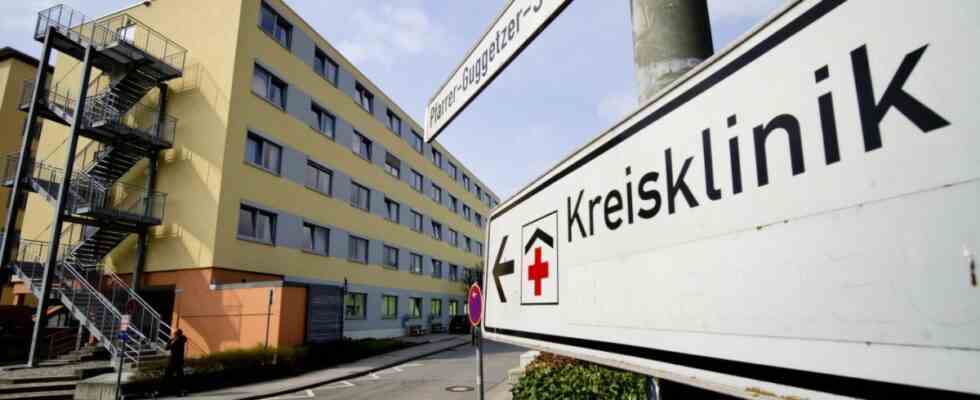Health Minister Karl Lauterbach promised nothing less than a “revolution” when he presented his plans for comprehensive hospital reform. The bottom line is that patients in German clinics should be treated more according to medical and less according to economic criteria in the future. For many institutions, this means a major change, as the previous approach had become firmly anchored in the structures in recent years. Major changes are also coming to the Ebersberg district clinic. Ideally, this improves patient care. However, if the switch does not work, the district hospital may even be threatened with closure.
Clinic manager Stefan Huber chose correspondingly drastic words when he presented his semi-annual report in the most recent district council meeting: “We still have to do a lot to get Level II. Otherwise we’ll fall down – and that would be fatal.” The level system mentioned by Huber is a core component of Lauterbach’s reform proposals. According to this, all hospitals should be divided into three levels of care: from basic care, which includes basic surgical procedures and emergencies, to standard and priority care, to maximum care, which is usually offered at university clinics.
There is a lot at stake for the Ebersberger Kreisklinik in the hospital reform
For a hospital like the Ebersberger Kreisklinik, the second stage is the declared goal – and also an absolute necessity. “It is essential to strive to meet the conditions. Otherwise our hospital would not be able to survive in the long term,” said Medical Director Peter Lemberger. According to Managing Director Huber, another specialist department has to be installed in Ebersberg and additional chief physicians have to be hired. In addition, some changes in the structures are necessary in order to meet the criteria for Level II, which then also provides for a strengthening of child care, among other things.
Stefan Huber is still in charge of the economic fortunes of the district clinic. In the course of the next year, however, he will move to Starnberg.
(Photo: Peter Hinz-Rosin)
Although Huber and Lemberger are confident that the district clinic will be able to implement this change in good time, a certain degree of uncertainty remains. Because not only the Ebersberg facility has to do its homework, all other hospitals in the region also want to go to the second level of care. “Of course there will be a lot of competition,” Stefan Huber is convinced. It is clear that not all clinics can reach Level II. For the district clinic, however, there is an opportunity to leave other hospitals behind – if you manage to meet all the conditions yourself.
Exactly what these are is not yet certain. So far it is only a draft from the Ministry of Health, which still has to be cast into law. For Huber and Lemberger, there is no question that hospital reform is absolutely necessary. “A ‘keep it up’ wouldn’t have worked. We’re currently on red alert,” says the managing director. Currently, the sick leave of the workforce is twelve percent – and thus higher than ever. Added to this is the shortage of skilled workers, which now no longer only affects the nursing staff, but also the doctors, as Lemberger added. The district clinic has therefore now started to pay its employees a bonus for recruiting employees.
Such a system would currently be good for the hospital itself – at least with a view to energy prices. “The costs for the clinic are gigantic,” said managing director Huber, who spoke of an increase of 100 percent in the area of gas and electricity supply. The government has announced relief, but so far no money has been received. “We’re excited to see what’s to come.”
In principle, however, the financial situation of the district clinic is quite decent – and that is not to be taken for granted. According to Huber, around 80 percent of municipal clinics will be in the red in 2022. Such a flood of deficits has not existed for 50 years. In Ebersberg, however, there was a minus in front of the final result in 2019, and in the following years the district clinic was always able to generate a profit. With this, the facilities can repay their possible deficits by 2026, so that the district of Ebersberg does not have to pay any loss compensation until then.
A pediatric practice will be attached to the district clinic in April
Huber and Lemberger also had good news with them when it came to patient care: The “Da Vinci” surgical robot, which will be used in urology, general surgery and gynaecology, is to be purchased by mid-2023. A positive funding notification was recently received. And the range of treatments is also being expanded at the medical care center attached to the clinic. From April there will be a specialist practice for gynecology and a pediatric practice – the latter, however, only as a half-time job, because, according to Huber, the Association of Statutory Health Insurance Physicians has not currently approved more seats. Nevertheless, one wants to try to integrate other pediatric practices in the district more closely in order to provide better child care across the board.

